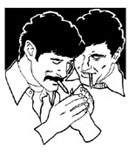
Separating the Sin From the Sinner
A PLEA FROM THE PEW
This is a tale of two sermons. I heard about one. I was present at the other. Although both confuse the sin with the sinner, they are at war with each other, and both are wrong.
A nurse at a hospital where I regularly go for treatment heatedly relayed the substance of the first sermon. She had attended a Mass at which the celebrant, in the course of his sermon, asked for prayers for the sick “except for people with AIDS, because it’s their own fault that they are sick.” Her anger was understandable. Except when it is necessary to treat or to comfort their patients, nurses do not pry into the causes of their patients’ illnesses. They simply strive to make sick people well or to make them comfortable if they cannot be made well. They do not discriminate among their patients on the basis of the innocence or immorality of the conduct that made them sick. My nurse could pray for people with AIDS because she could separate the sinner from the sin (assuming both a sinner and a sin). Because the priest (call him Father X) could not, he was led to condemn both.
The priest who delivered the second sermon, the one I heard, was also unable to make the distinction. He (call him Father Y) discoursed on the need for the Church to be “inclusive,” and referred in particular to the plight of people with AIDS, for whom, he said, we should feel nothing but compassion. From there, he moved to a mandate for love toward homosexuals, whom he apparently equated with AIDS. Finally, after remarking on “the dysfunction in the Church’s teaching on human sexuality,” he called for “tolerance” of the homosexual lifestyle. Because Father Y could not separate the sin from the sinner, he was led to accept both.
I do not have AIDS; I am not HIV-positive; I do not belong to any HIV risk group. I do have a disease the cause of which remains a mystery to medical science. I have been told that the chances of my being cured — i.e., of surviving my disease — may be as low as 25 percent. Ironically, these could be poorer odds than those now faced by people with AIDS. I say ironically because for two out of the past two and a half years, I have spent every Tuesday afternoon and a number of Tuesday evenings as a volunteer on the AIDS wards of a New York hospital.
You May Also Enjoy
The savage killing of six Jesuit priests in El Salvador last November underscored once again…
Ed. Note: Fr. Nouwen here continues the chronicle of the time he spent in Germany…
Learning From Jesus How to Be An Effective Military Leader... A Massive Failure to Teach Catholic Truth... Everyone Is Intolerant at Some Point... Would 'Compulsion' Be Hell... Bishop Morlino Discusses the 'Dictatorship of Relativism'...

